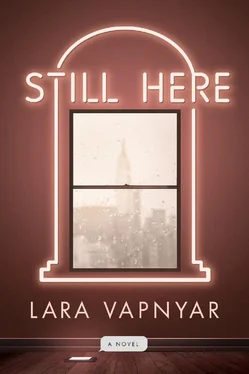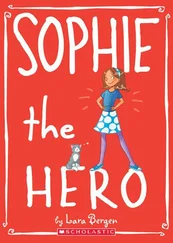Vadik stared into his glass for a long time, then sighed. “Did you know that I wanted to kill myself, when I lived out in Jersey?”
Not the bike story again, Vica thought. She had heard it three or four times before. As had Sergey. As had Regina. But they all looked at Vadik attentively. Even Bob did.
“Yeah, that’s right. I wanted to kill myself. It happened eight years ago when I first came here. I lived in Carteret first, then in Avenel. Avenel had Mom’s Diner. Carteret had a view of the Staten Island dump. In Avenel, I rented a two-bedroom. I had just come from Istanbul and I had a two-bedroom there, so I thought that that was what I wanted. But in Istanbul, I had furniture, and here there were three enormous rooms, perfectly empty. I put the bed in the master bedroom. I put the TV and the exercise bike in the living room, but there was nothing left for the second bedroom. The emptiness scared me. I tried to avoid it, but I kept wandering in. So I decided to put the exercise bike in the middle of the second bedroom. It looked small in all that empty space. I got on it and started pushing the pedals. I was pushing and pushing, but then I caught my reflection in one of the windows. I was perched on that bike, pushing the pedals, inside of that huge white box. I looked like a lab rat strapped to some piece of equipment. I got off the bike, went to the bathroom, and grabbed a bottle of Tazepam. I didn’t know how many pills I’d need to kill myself. Ten? Twenty? Thirty just to be sure? I unscrewed the bottle and there were three. Just three. I remember thinking how pathetic that was. Well, I took those three and went to sleep. I slept for fourteen hours. When I woke up, I packed up my things — a suitcase, a computer bag, and two boxes of books — and escaped to the city.”
Regina started either sniffling or snickering, as she always did at the end of this story.
“What’s Tazepam?” Bob asked.
“Russian tranquilizer,” Sergey explained.
“Can you get it here?”
“I don’t know. It’s kind of like Xanax but deadlier.”
“So how many do you need to off yourself?” Bob asked.
“Still no idea,” Vadik said. “I wish there was an app that helped you commit suicide. Just, you know, help you find the easiest and most rational way to do it.”
“Suicide Buddy?” Sergey asked. They all laughed.
Now, now was the perfect moment to bring up Sergey’s idea! Vica thought. But Sergey being Sergey, he wasn’t getting it.
Vica reached around Regina’s back and prodded Sergey with her fork. He didn’t budge. She prodded him harder. He glared at her. She knew exactly what he was thinking: that she was a coldhearted bitch to try to pitch their idea right after the suicide story. But she didn’t care what he thought.
“Bob,” she said.
Bob raised his eyes to her. His eyes were now the same color as his face. Red. Forget about their encounter in the kitchen, he looked as if he’d have trouble remembering who she was. She hoped he wasn’t past lucidity.
“Bob!”
“Yeah?”
“Speaking of death…”
“Yeah?”
“Sergey has the most amazing idea for an app.”
They all stared at her as if she were drunk. She was tipsy, but she didn’t care. She didn’t care about being subtle either. She would just pitch the idea head-on. And she would pitch it right to Bob.
“This new app, Bob. It would allow you to fight death.”
Bob stretched and screwed up his face while making an honest effort to understand. “To fight death?” he asked.
Sergey cleared his throat. They all turned to look at him.
“Well, not exactly, of course, but it would allow you to keep your online presence after you die,” Sergey said, “to remain immortal in a virtual reality. You see, the idea that inspired me comes from a nineteenth-century Russian philosopher, Nikolai Fyodorov.”
No, not Fyodorov! Vica thought. But then she looked around and saw that Bob was listening with great interest.
“Fyodorov’s main idea was the resurrection of the fathers. He thought that it was the duty of every son to resurrect his father.”
“Huh,” Bob said. “My shrink thinks just the opposite. ‘Bury your father’ is what he tells me. Bury your father, free yourself of his grip, or you’ll never become your own man.”
“Well, not so in Fyodorov’s opinion. He thought that the problem with modern man was that he had lost connection to his ancestors. Fyodorov thought that mortality was conquerable, and it was also necessary to conquer, because mortality was the source of all the evil among men. I mean, why be good if you’re going to die anyway? Fyodorov argued that the struggle against mortality should become the common cause for all humans, regardless of their ethnicity or social status. Science was advancing in such a fast and powerful way that it would soon be possible to make human life infinite and to revive the dead. Fyodorov thought that eventually we could collect and synthesize the molecular material of the dead. He actually predicted cloning.”
Sergey was gaining confidence as he spoke. He had such an impressive voice — slightly scratchy, but deep and commanding. Vica had forgotten how much she had always loved his voice. Even his English had improved. He still had a strong accent, but it was the accent of a confident man.
“What year was this?” Bob asked.
“The 1880s,” Sergey said.
“That’s pretty amazing,” Bob said.
“But Fyodorov thought that the genetic or physical restoration of a person wasn’t enough. It was also necessary to give the revived person his old personality. Fyodorov explored the theory of ‘radial images’ that may contain the personalities of the people and survive after death, but he had a very vague idea of how to preserve or extract those images.”
“ ‘Radial images’?” Bob asked.
“I think he meant the soul,” Vadik said.
“Yes, the soul,” Sergey said. “The soul that is supposed to be immortal by definition, but it’s really not. Because where does it go after we die?”
“Right,” Bob said.
Vica saw that his eyes were beginning to glaze over and that he was looking for a bottle of wine. She peered at Sergey, trying to communicate: “Get off Fyodorov!” He wasn’t looking at her.
“And that was Fyodorov’s problem. How do you go about preserving something if you don’t know how to find it?”
“Right,” Bob said again.
“But now we know where to find it.”
“We do?”
“We do. It’s in your online presence. Your e-mail. Your Twitter. Your Facebook. Your Instagram or whatever. That’s where people now share their innermost feelings and thoughts, whatever they find funny or memorable or simply worthy in any way. Our online presence is where the essence of a person is nowadays.”
“Right!” Bob said. The phrase online presence seemed to revive him a little.
“And that’s where my app comes in.”
Sergey listed the basics of Virtual Grave. “I created a linguistic algorithm that would allow you to preserve and re-create a virtual voice of a deceased person from all of the texts he had created online while he was alive. It’s not that hard to run the entire flow of somebody’s speech through a program and come up with semantic and syntactic patterns as well as the behavorial patterns determined by people’s online personalities. Suppose your loved one suddenly died. You would be able to connect Virtual Grave to her social media accounts, run the app, and re-create her voice. Then you would be able to ask her questions. No, the answers aren’t expected to be meaningful — this is not spiritualism. But we don’t need meaningful advice from dead people anyway. It’s the contact that matters, the illusion that they are still present somewhere, watching over us, if only virtually.”
Читать дальше












